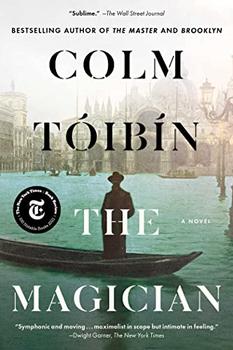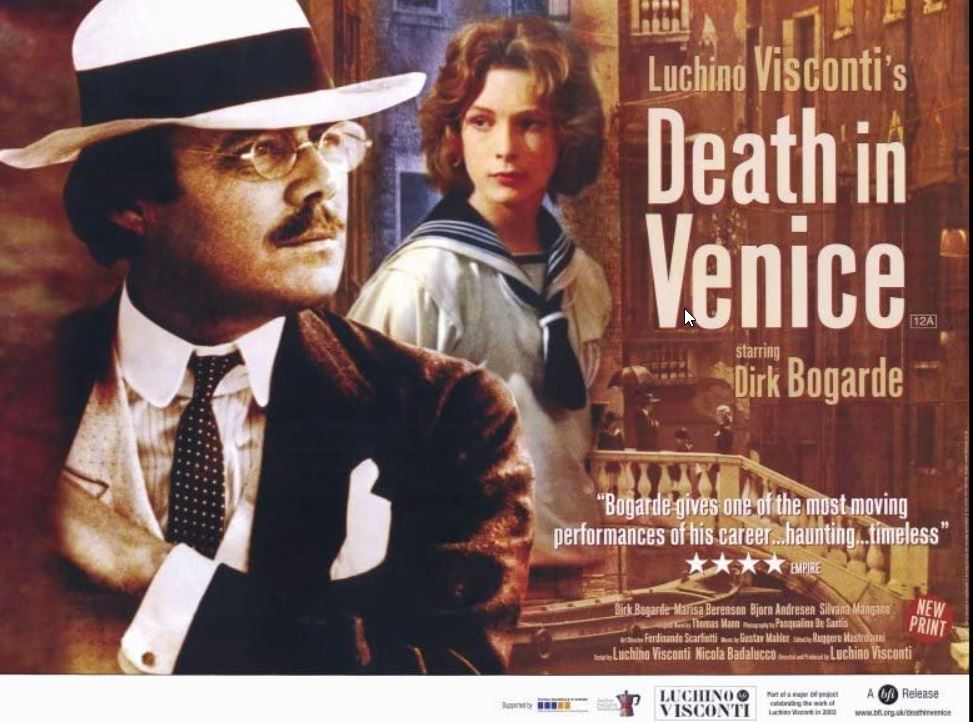Summary | Excerpt | Reading Guide | Reviews | Beyond the Book | Read-Alikes | Genres & Themes | Author Bio

A Novel
by Colm ToibinThis article relates to The Magician
 Which is better — the book or the film? That question is often debated when a much-loved book is turned into a movie. Death in Venice — the novella written by Thomas Mann and published in 1912 — is perhaps the author's best-known work, not least because it was made into a film by the great Italian director Luchino Visconti in 1971. But which is better?
Which is better — the book or the film? That question is often debated when a much-loved book is turned into a movie. Death in Venice — the novella written by Thomas Mann and published in 1912 — is perhaps the author's best-known work, not least because it was made into a film by the great Italian director Luchino Visconti in 1971. But which is better?
The novella had its origins in a visit Mann made with his wife and children to Venice in 1911. For some time prior to this, according to a letter he wrote at the time, he had wished to write a story about "passion as confusion and degradation" based on the true story of German writer Johann Goethe's love for an 18-year-old baroness. While in Venice, Mann became fascinated by a young Polish boy he observed in the hotel where he and his family were staying, and also with the recent death of composer Gustav Mahler.
These three matters coalesced in Death in Venice. In the novella, Mann transformed Mahler into his protagonist, writer Gustav von Aschenbach, and Goethe's desire for the young woman became Aschenbach's passion for a 14-year-old Polish boy named Tadzio.
Aschenbach first sights Tadzio in the dining room of his Venetian hotel, in much the same way Mann saw "his" Polish boy. Aschenbach is captivated by Tadzio's beauty and becomes obsessed with the boy but convinces himself his interest is strictly of an aesthetic nature.
Drawing on his belief that his artistic inspiration was profoundly intertwined with his homosexual desires, Mann articulates in Death in Venice the struggle Aschenbach experiences when faced with the beauty of Tadzio, who seems to be enticing him to relinquish his identity as an artist. Discovering later that there is a cholera outbreak in Venice, Aschenbach is convinced that the epidemic is a metaphor for his corrupt passion for Tadzio. On the day of Tadzio's departure, Aschenbach, now very ill, sees him for the last time on the beach and believes the boy is beckoning to him. Aschenbach rises from his deck chair, collapses and dies.
In common with much of his work, Mann articulates in Death in Venice his conflicted feelings about his art and his homosexuality — the innate tension between expression and repression.
The novella was tremendously popular when it was published, and its controversial themes sparked much critical debate, as they still do today. A recent essay appearing in the Los Angeles Review of Books, for instance, looks at the story through a contemporary lens, comparing the Venetian response to the cholera outbreak in the novella to the COVID-19 response by capitalist countries around the world.
Luchino Visconti, a theater, opera and film director, is considered to be one of the fathers of Italian neo-realism in cinema. His later films, including Death in Venice, explore beauty, death and European history.
The film did not review well. Most critics argued that somehow Visconti lost — or discarded — the subtleties and nuances of Mann's novella. Instead of an aged writer, Aschenbach is a middle-aged composer; and instead of articulating Aschenbach's complex relationship with Tadzio — to whom he never speaks — it tells the story of homosexual obsession. In Mann's book, Tadzio is supposed to represent an ideal of beauty that is in many ways separate from sexuality. In Visconti's film, though, Tadzio's sensuality is over-emphasized and thus the tension in the novella between beauty and intellect is undermined and reduced.
But for all that, Visconti's later films were thought to be visually stunning, and Death in Venice was no exception. As the great and late film critic Roger Ebert said in his review, "the physical beauty of the film itself is overwhelming … and Visconti's mastery of visual style almost succeeds in creating the very ideas and feelings that his heavy-handed narrative entirely misses."
So, while the film certainly had its strengths, the critical response suggests the novella is the better work of art.
Death in Venice (1971) movie poster, courtesy of IMDB
Filed under Books and Authors
![]() This "beyond the book article" relates to The Magician. It originally ran in October 2021 and has been updated for the
September 2022 paperback edition.
Go to magazine.
This "beyond the book article" relates to The Magician. It originally ran in October 2021 and has been updated for the
September 2022 paperback edition.
Go to magazine.






I have always imagined that paradise will be a kind of library
Click Here to find out who said this, as well as discovering other famous literary quotes!
Your guide toexceptional books
BookBrowse seeks out and recommends the best in contemporary fiction and nonfiction—books that not only engage and entertain but also deepen our understanding of ourselves and the world around us.